WinSavvy Editorial Standards
How this article was created
- 1. Why Is Experiential Marketing Crucial for Consumer Purchase Decisions?
- 2. How Does Experiential Marketing Affect Word-of-Mouth?
- 3. Do Consumers Prefer Branded Event Experiences?
- 4. How Do Consumers Feel About Brands After Attending Events?
- 5. What Do Marketers Think About Experiential Marketing?
- 6. How Does Experiential Marketing Influence Digital and Social Content?
- 7. What Is the ROI of Experiential Marketing?
- 8. How Likely Are Consumers to Recommend a Brand After an Experiential Event?
- 9. What Influence Do Live Events Have Compared to TV Ads?
- 10. How Many Consumers Become Regular Customers After an Experiential Event?
- 11. Why Do B2B Marketers Favor In-Person Events?
- 12. What Is the Top Goal for Experiential Marketing According to Event Marketers?
- 13. How Does Experiential Marketing Affect Purchase Intent?
- 14. What Sales Impact Do Companies See with Experiential Marketing?
- 15. How Does Experiential Marketing Foster Customer Relationships?
- 16. How Effective Is Experiential Marketing in Lead Generation?
- 17. Why Do Millennials Prefer Experiential Marketing?
- 18. How Effective Are Branded Products at Events?
- 19. How Likely Are Experiential Campaigns to Be Shared on Social Media?
- 20. Are Event Budgets Increasing?
- 21. How Do B2B Companies Use Events for Lead Generation?
- 22. How Does Experiential Marketing Affect Brand Recall?
- 23. What Are Consumers' Perceptions of Brands After Experiential Events?
- 24. How Do In-Person Events Affect Consumer Connections to Brands?
- 25. How Likely Are Event Attendees to Share Their Experiences?
- 26. How Does Experiential Marketing Affect Customer Satisfaction Rates?
- 27. Why Is Experiential Marketing Vital to Brand Strategy?
- 28. How Does Experiential Marketing Influence Purchase Likelihood?
- 29. What Impact Does Experiential Marketing Have on Customer Advocacy?
- 30. How Do Consumers' Perceptions of Brands Change After Experiential Events?
- Conclusion
- We got all the latest Marketing Stats here:
1. Why Is Experiential Marketing Crucial for Consumer Purchase Decisions?
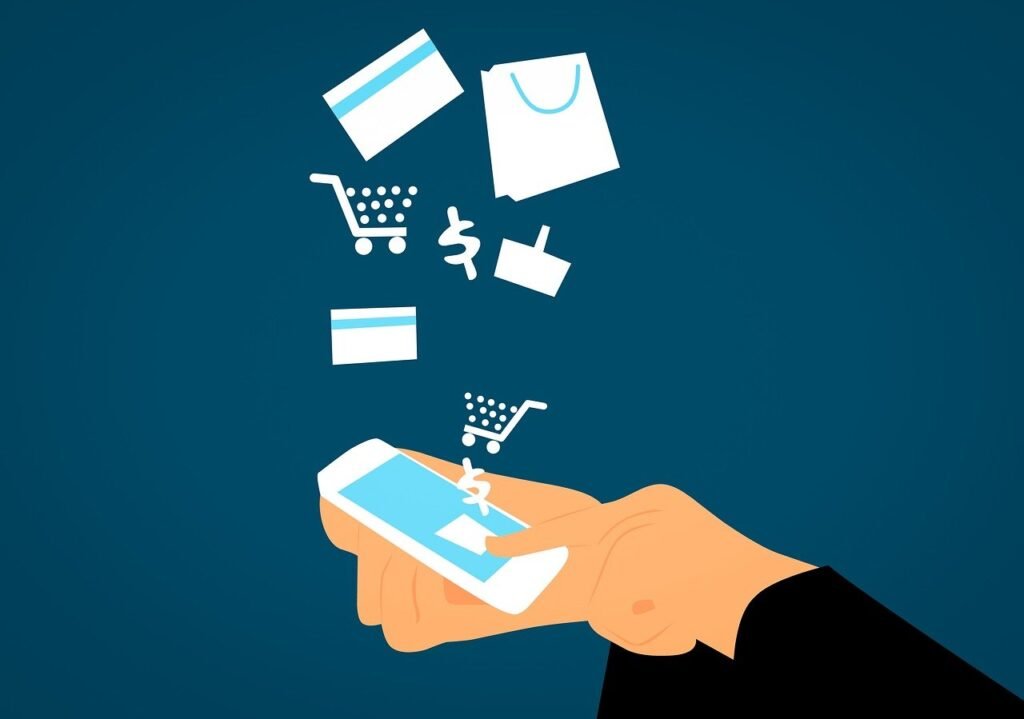
Experiential marketing’s impact on consumer purchases
Experiential marketing has proven to be a powerful tool in influencing consumer purchase decisions. A staggering 85% of consumers are more likely to make a purchase after participating in an experiential marketing event. This high conversion rate highlights the effectiveness of engaging customers in a hands-on, immersive way.
These events allow consumers to interact with products and brands in a meaningful manner, creating emotional connections that drive purchasing behavior. Unlike traditional advertisements, experiential marketing creates a memorable experience that resonates with consumers long after the event has ended, leading to higher sales and brand loyalty.
2. How Does Experiential Marketing Affect Word-of-Mouth?
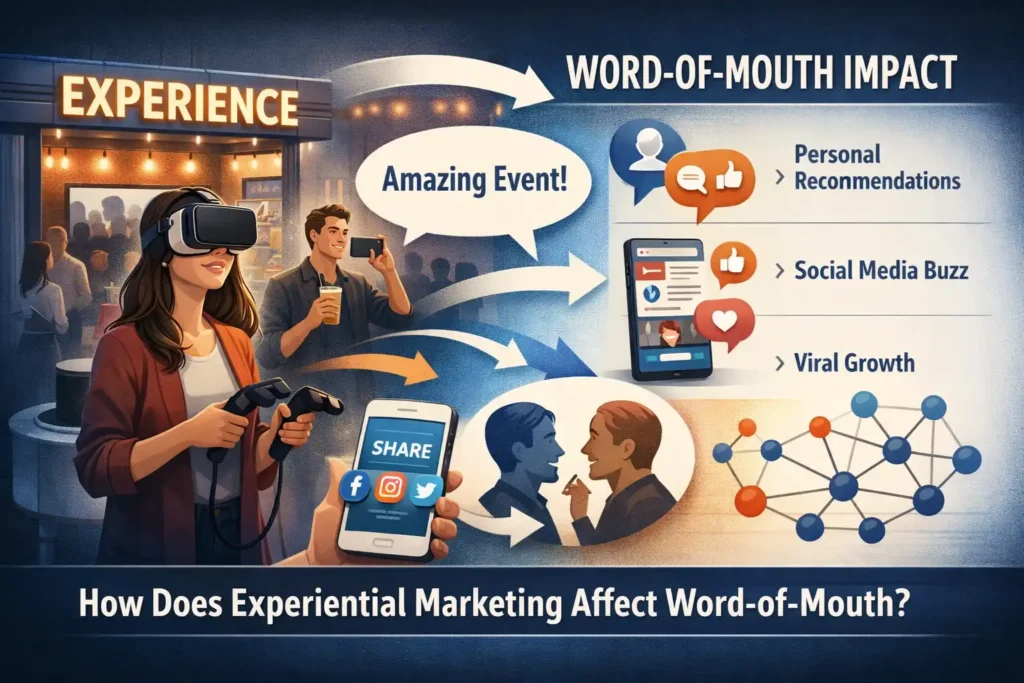
Boosting word-of-mouth through experiences
Experiential marketing generates 3.6 times more word-of-mouth than traditional marketing. This statistic underscores the power of creating shareable, memorable experiences that people talk about with their friends and family. When consumers have a positive experience with a brand, they are more likely to share it, either in person or on social media, amplifying the brand’s reach and credibility.
Word-of-mouth is a trusted source of information for many consumers, making it a valuable outcome of experiential marketing efforts. By designing experiences that are fun, engaging, and share-worthy, brands can significantly boost their visibility and reputation.
3. Do Consumers Prefer Branded Event Experiences?
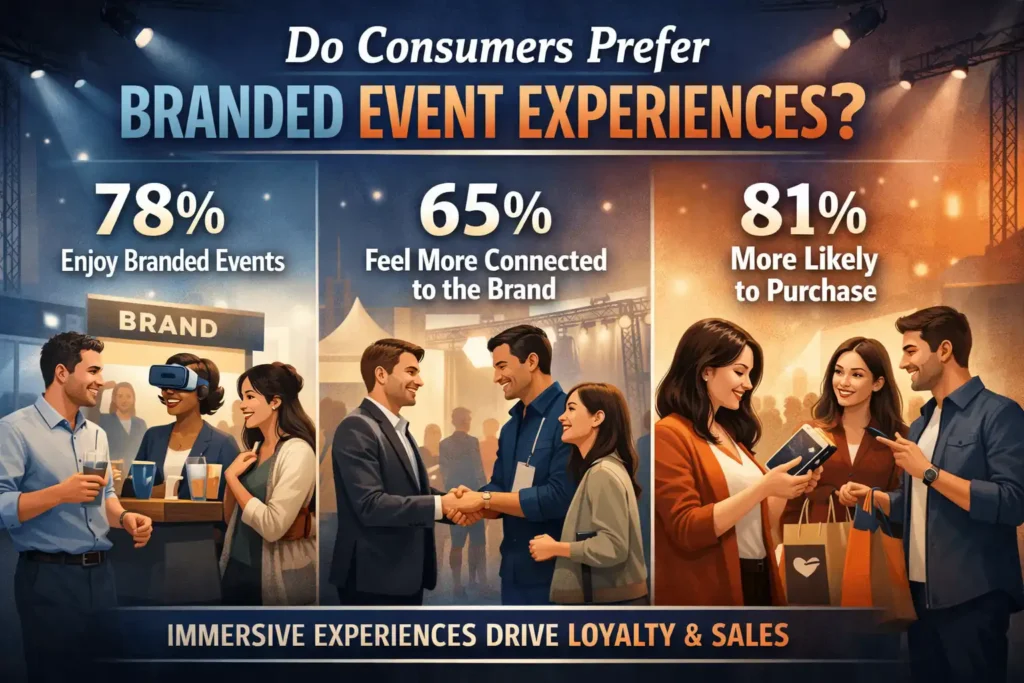
Consumer preferences for branded experiences
A significant 74% of consumers say engaging in branded event experiences makes them more likely to buy the products being promoted. This preference for experiential interactions indicates that consumers value opportunities to engage with brands in a direct and personal way.
Branded events provide a platform for consumers to see, touch, and experience products firsthand. This hands-on interaction builds trust and confidence in the product, making consumers more likely to purchase. Furthermore, these experiences can be tailored to highlight the unique selling points of the product, providing a deeper understanding and appreciation of the brand.
4. How Do Consumers Feel About Brands After Attending Events?
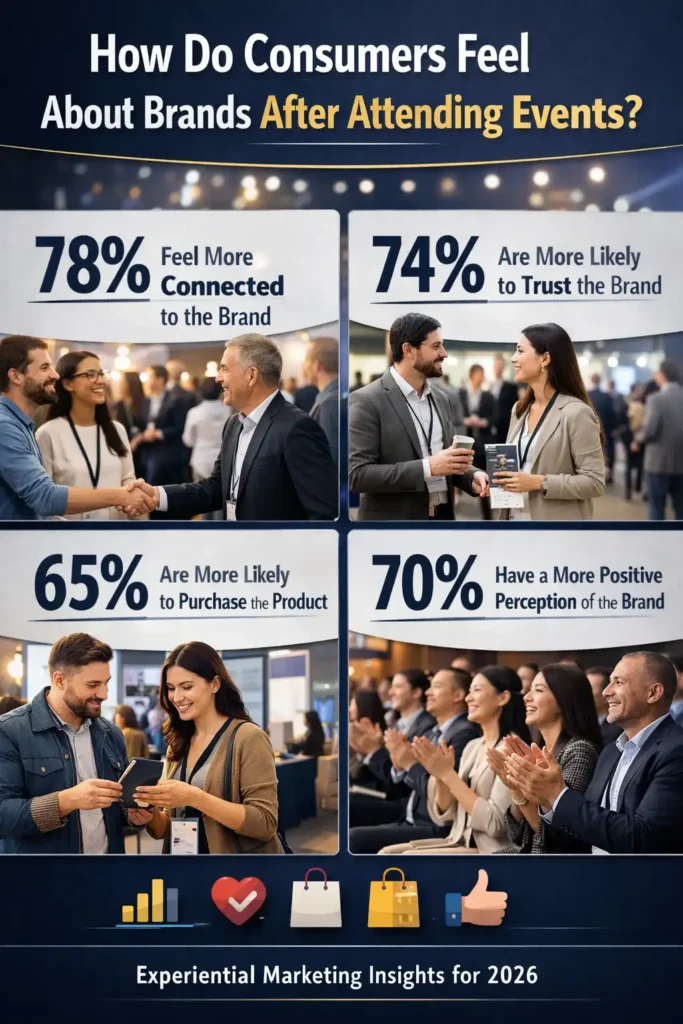
Positive brand perceptions post-event
An impressive 91% of consumers have positive feelings about a brand after attending an event. This statistic highlights the effectiveness of experiential marketing in shaping favorable brand perceptions. Positive emotions associated with memorable experiences can enhance brand loyalty and encourage repeat business.
By creating engaging and enjoyable events, brands can leave a lasting impression on consumers. These positive interactions can translate into long-term customer relationships, as satisfied consumers are more likely to remain loyal to brands that provide meaningful experiences.
5. What Do Marketers Think About Experiential Marketing?
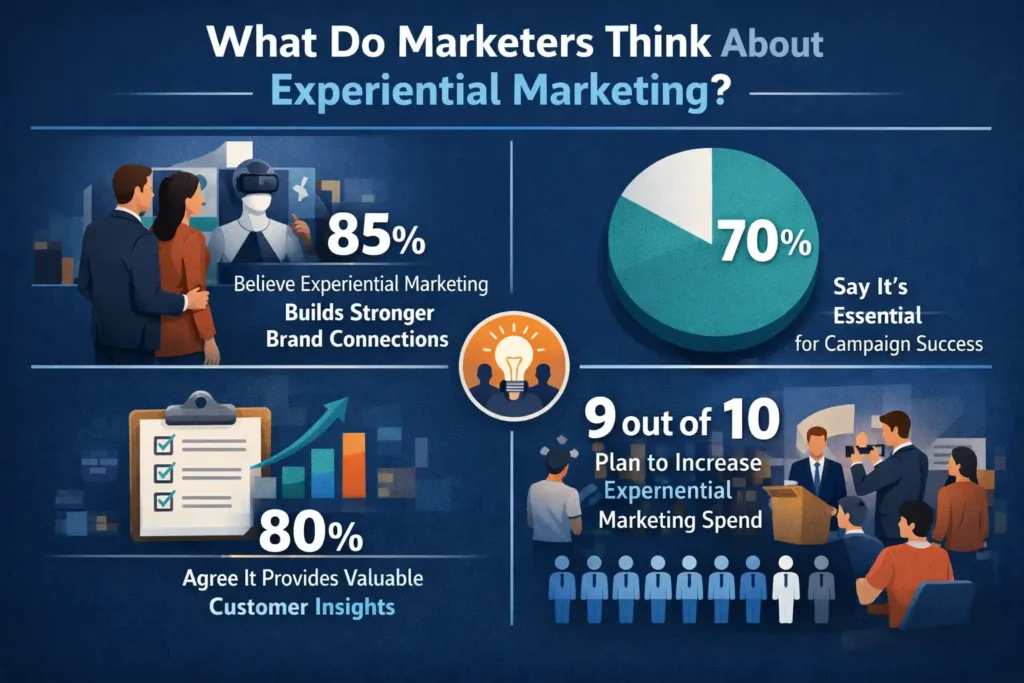
Marketers’ views on experiential marketing
A substantial 79% of marketers say experiential marketing is crucial to their marketing strategies. This statistic reflects the growing recognition of experiential marketing’s value in building brand awareness, engaging customers, and driving sales.
Marketers understand that creating memorable experiences can differentiate their brand in a crowded marketplace. By investing in experiential marketing, they can connect with consumers on an emotional level, fostering deeper relationships and increasing brand loyalty. As a result, experiential marketing has become an essential component of modern marketing strategies.
6. How Does Experiential Marketing Influence Digital and Social Content?
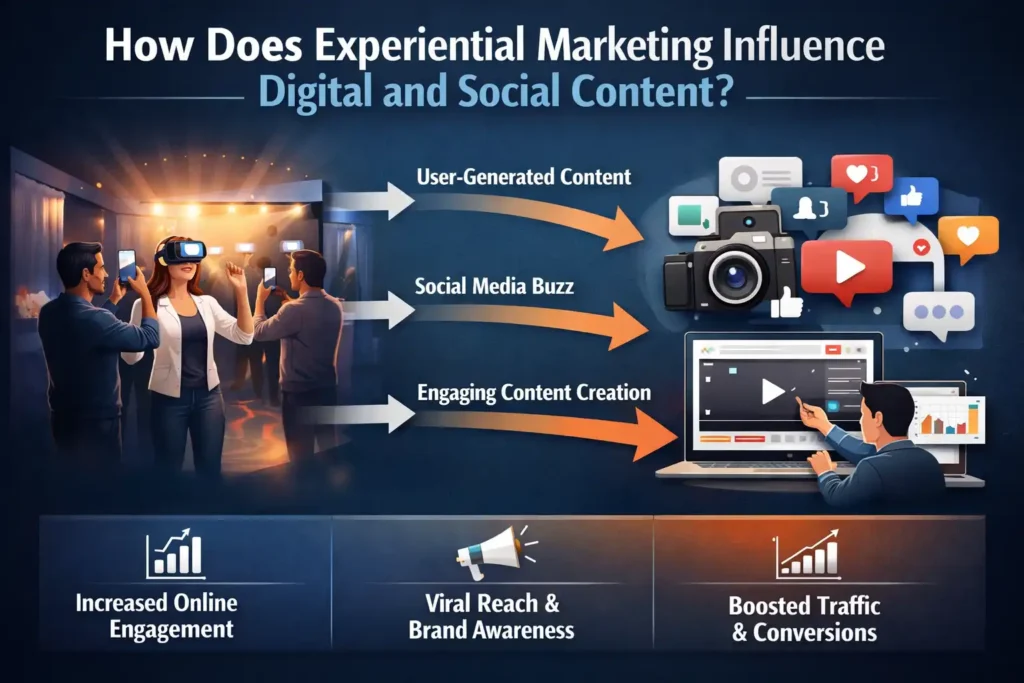
Digital engagement from experiential marketing
Experiential marketing has a significant impact on digital and social content, with 98% of consumers creating digital or social content at events and experiences. This statistic emphasizes the role of experiential marketing in generating user-generated content, which can amplify a brand’s online presence.
When consumers share their experiences on social media, they effectively become brand ambassadors, spreading the word to their networks. This organic promotion can enhance the brand’s visibility and credibility, attracting more potential customers. By designing events that encourage sharing, brands can leverage the power of social media to reach a wider audience.
7. What Is the ROI of Experiential Marketing?
ROI insights for experiential marketing
Experiential marketing offers a compelling return on investment, with 48% of brands realizing an ROI of between 3:1 to 5:1 on their investments. This statistic demonstrates the financial benefits of engaging consumers through memorable experiences.
The high ROI is a result of increased brand loyalty, higher sales, and extensive word-of-mouth promotion. By creating impactful experiences, brands can achieve significant returns, making experiential marketing a cost-effective strategy for driving business growth.
8. How Likely Are Consumers to Recommend a Brand After an Experiential Event?
Consumer recommendations post-event
A remarkable 85% of consumers say they would recommend a brand, product, or service after participating in an experiential marketing event. This statistic underscores the power of experiential marketing in generating positive word-of-mouth and brand advocacy.
When consumers have a memorable and enjoyable experience with a brand, they are more inclined to share their positive impressions with others. Recommendations from friends and family are highly influential, often leading to increased brand awareness and new customer acquisition. By creating experiences that leave a lasting impact, brands can turn consumers into enthusiastic advocates.
9. What Influence Do Live Events Have Compared to TV Ads?
The impact of live events versus TV ads
An overwhelming 93% of consumers claim that live events have a larger influence on them than TV ads. This statistic highlights the superior effectiveness of experiential marketing in engaging consumers and driving behavior.
Live events provide an interactive and immersive experience that traditional TV ads cannot match. Consumers can engage with the brand in real-time, ask questions, and experience the product firsthand. This direct interaction creates a deeper connection and understanding, making live events a more impactful marketing strategy.
10. How Many Consumers Become Regular Customers After an Experiential Event?

Conversion to regular customers
A notable 70% of users become regular customers after an experiential marketing event. This high conversion rate demonstrates the effectiveness of experiential marketing in turning one-time participants into loyal customers.
Experiential events provide an opportunity for brands to showcase their products in a compelling and memorable way. By creating positive experiences, brands can build trust and loyalty, encouraging repeat purchases and long-term customer relationships.
11. Why Do B2B Marketers Favor In-Person Events?
The effectiveness of in-person events for B2B marketers
In-person events are highly valued by B2B marketers, with 67% rating them as their most effective content marketing strategy. This statistic reflects the importance of face-to-face interactions in building business relationships and generating leads.
B2B events provide a platform for marketers to connect with potential clients, demonstrate their expertise, and build trust. These interactions are crucial for establishing long-term business partnerships and driving sales. By investing in in-person events, B2B marketers can enhance their credibility and visibility in the market.
12. What Is the Top Goal for Experiential Marketing According to Event Marketers?
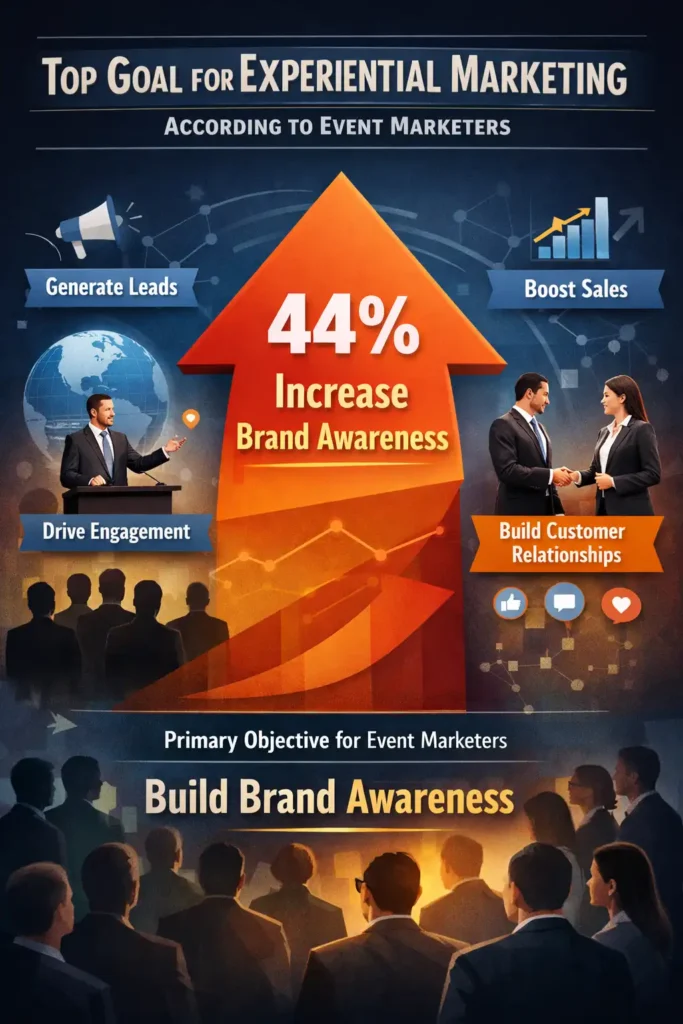
Primary objectives of experiential marketing
Increasing brand awareness is the top goal for experiential marketing, according to 91% of event marketers. This statistic highlights the importance of creating memorable experiences that elevate brand visibility and recognition.
Experiential marketing allows brands to engage with consumers in a unique and impactful way, making a lasting impression. By focusing on brand awareness, marketers can attract new customers, strengthen their market position, and drive business growth.
13. How Does Experiential Marketing Affect Purchase Intent?
Impact on purchase intent
Experiential marketing increases purchase intent by 30% among participants. This statistic demonstrates the effectiveness of engaging consumers through immersive experiences in driving sales.
By allowing consumers to interact with products and experience them firsthand, brands can create a deeper understanding and appreciation. This direct engagement fosters trust and confidence, making consumers more likely to purchase the product. Experiential marketing thus serves as a powerful tool for converting interest into action.
14. What Sales Impact Do Companies See with Experiential Marketing?
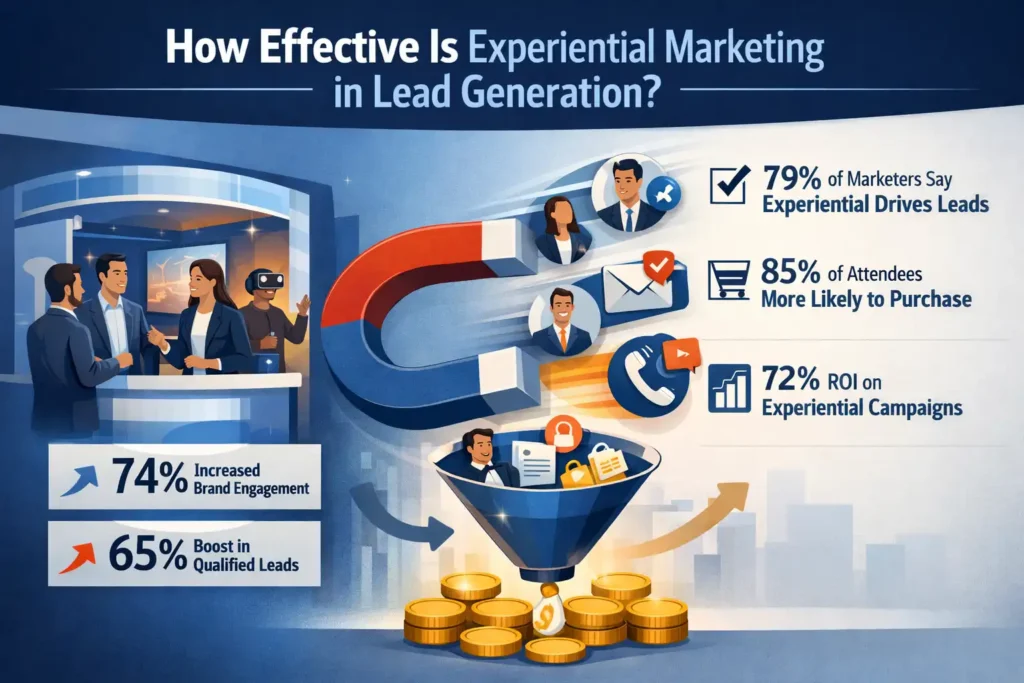
Sales benefits of experiential marketing
Experiential marketing has a significant impact on sales, with 80% of companies reporting increased sales. This statistic underscores the financial benefits of investing in experiential marketing strategies.
By creating memorable and engaging experiences, brands can drive consumer interest and loyalty, leading to higher sales. These events provide an opportunity to showcase products in a compelling way, encouraging consumers to make a purchase. As a result, experiential marketing proves to be a highly effective tool for boosting revenue.
15. How Does Experiential Marketing Foster Customer Relationships?
Building relationships through experiences
Experiential marketing is believed to foster ongoing relationships with customers, according to 59% of marketers. This statistic highlights the role of experiential marketing in building long-term customer loyalty and engagement.
By creating positive and memorable experiences, brands can strengthen their connection with consumers. These interactions build trust and loyalty, encouraging repeat business and long-term relationships. Experiential marketing thus serves as a valuable strategy for nurturing customer relationships and driving retention.

16. How Effective Is Experiential Marketing in Lead Generation?
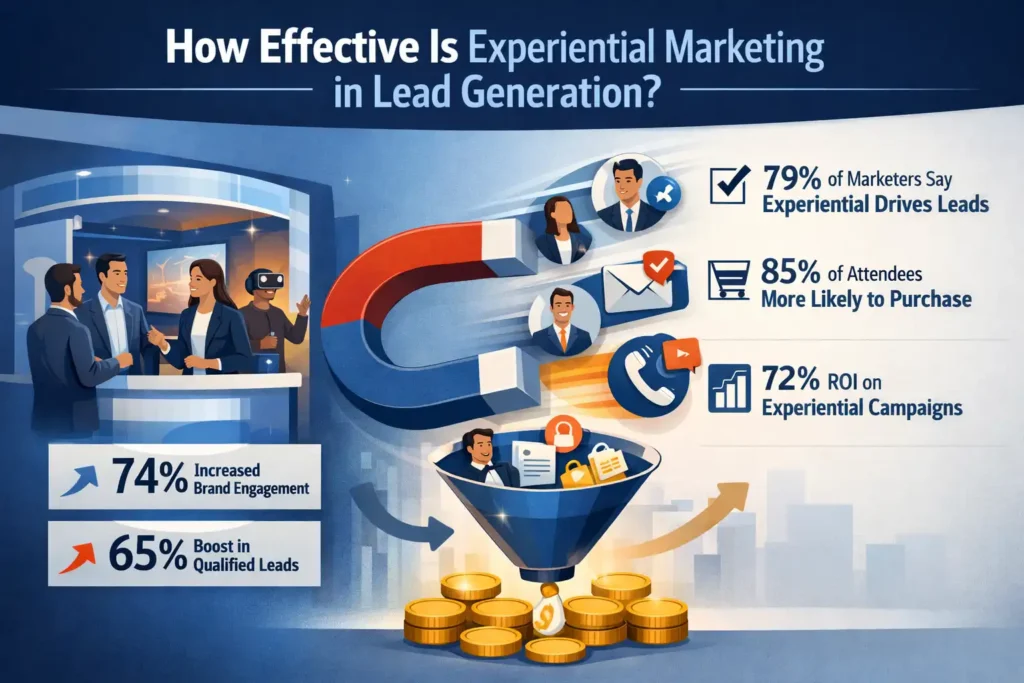
Lead generation through experiential marketing
Experiential marketing generates up to 50% more leads than other marketing strategies. This statistic demonstrates the effectiveness of engaging consumers through memorable experiences in driving lead generation.
Experiential events provide an opportunity for brands to connect with potential customers in a direct and impactful way. By creating engaging and interactive experiences, brands can capture consumer interest and generate valuable leads. This increased lead generation can drive business growth and enhance marketing ROI.
17. Why Do Millennials Prefer Experiential Marketing?
Millennials’ preference for experiences
A notable 78% of millennials prefer spending money on experiences over material things. This statistic highlights the growing trend among younger consumers to value experiences that create memories and personal fulfillment.
Experiential marketing caters to this preference by offering unique and engaging events that resonate with millennials. These experiences provide opportunities for social interaction, personal growth, and memorable moments, making them more appealing than traditional marketing methods. By tapping into this preference, brands can connect with millennials on a deeper level and drive engagement.
18. How Effective Are Branded Products at Events?
Utilization of branded products post-event
A significant 67% of event attendees use branded products they received at events. This statistic demonstrates the effectiveness of distributing branded merchandise in creating lasting impressions and reinforcing brand recall.
Branded products serve as tangible reminders of the event and the brand, keeping the brand top-of-mind for consumers. These items can also spark conversations and increase brand visibility when used in everyday life. By providing high-quality and useful branded products, brands can enhance their experiential marketing efforts and drive long-term engagement.
19. How Likely Are Experiential Campaigns to Be Shared on Social Media?
Social media sharing of experiential campaigns
Experiential marketing campaigns are 30% more likely to be shared on social media. This statistic underscores the power of creating shareable experiences that amplify a brand‘s reach and visibility.
Social media platforms provide a space for consumers to share their experiences and connect with others. By designing events that encourage sharing, brands can leverage user-generated content to enhance their online presence. This organic promotion can attract new customers and build brand credibility, driving further engagement and growth.
20. Are Event Budgets Increasing?

Trends in event marketing budgets
A majority of 56% of brands say their event budgets have increased over the past year. This statistic reflects the growing recognition of the value of experiential marketing and the increasing investment in creating impactful experiences.
As brands realize the benefits of engaging consumers through memorable events, they are allocating more resources to experiential marketing. This trend indicates a shift towards prioritizing experiences that drive consumer engagement, brand loyalty, and sales. By increasing event budgets, brands can enhance the quality and impact of their experiential marketing efforts.
21. How Do B2B Companies Use Events for Lead Generation?
Lead generation strategies for B2B companies
A significant 73% of B2B companies use events to generate leads and engage with prospects. This statistic highlights the importance of experiential marketing in the B2B sector for driving business growth and building relationships.
Events provide a platform for B2B companies to showcase their products and services, connect with potential clients, and demonstrate their expertise. These interactions are crucial for building trust and credibility, leading to valuable business partnerships. By investing in experiential marketing, B2B companies can enhance their lead generation efforts and drive sales.
22. How Does Experiential Marketing Affect Brand Recall?
Enhancing brand recall through experiences
Experiential marketing events see a 65% increase in brand recall. This statistic demonstrates the effectiveness of creating memorable experiences in enhancing brand recognition and recall.
When consumers participate in engaging and enjoyable events, they are more likely to remember the brand associated with the experience. This increased brand recall can lead to higher sales and long-term loyalty. By designing impactful experiences, brands can ensure that they remain top-of-mind for consumers.
23. What Are Consumers’ Perceptions of Brands After Experiential Events?
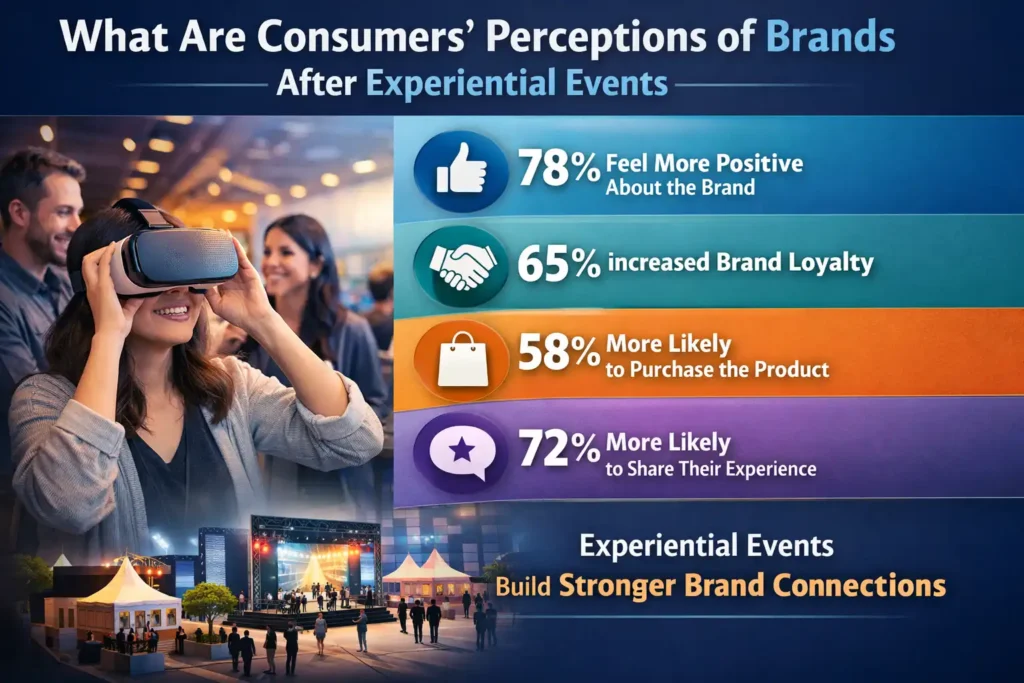
Improved brand perceptions post-event
An impressive 83% of participants report improved perception of a brand after attending an experiential event. This statistic highlights the role of experiential marketing in shaping positive brand perceptions and enhancing reputation.
By creating enjoyable and memorable experiences, brands can build positive associations and foster goodwill among consumers. These positive perceptions can lead to increased loyalty, repeat business, and word-of-mouth promotion. Experiential marketing thus serves as a powerful tool for enhancing brand image and reputation.
24. How Do In-Person Events Affect Consumer Connections to Brands?
Building connections through in-person events
A significant 60% of consumers feel more connected to a brand after an in-person event. This statistic underscores the importance of face-to-face interactions in building emotional connections and brand loyalty.
In-person events provide an opportunity for consumers to engage with brands in a direct and personal way. These interactions create a sense of connection and belonging, fostering deeper relationships and loyalty. By investing in in-person events, brands can enhance consumer engagement and drive long-term loyalty.
25. How Likely Are Event Attendees to Share Their Experiences?
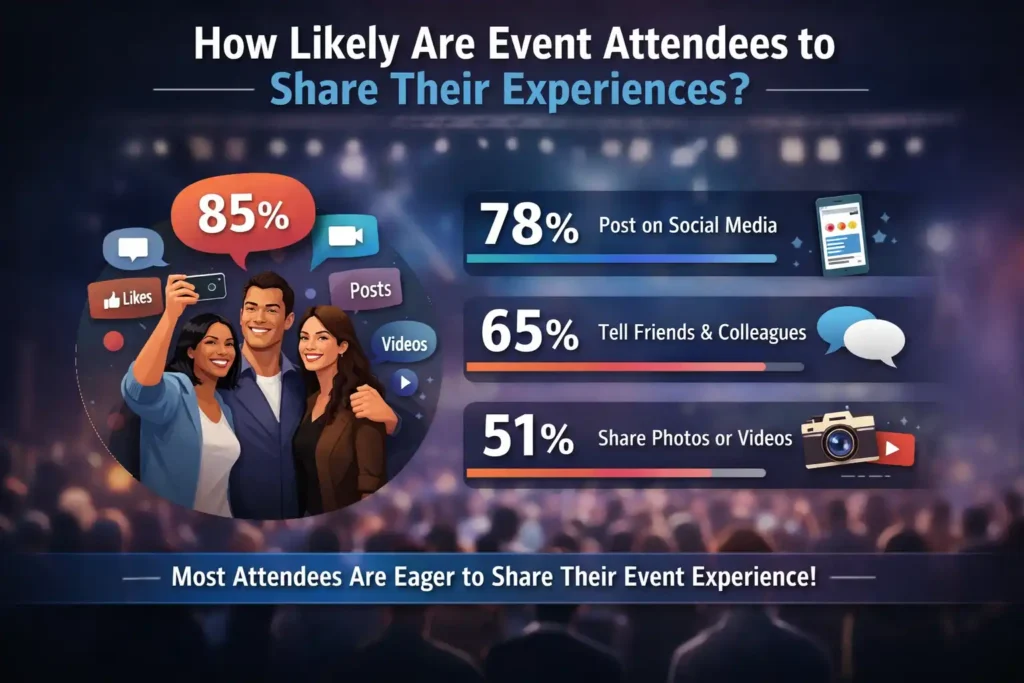
Sharing experiences post-event
A remarkable 92% of event attendees are more inclined to tell others about their experience. This statistic highlights the role of experiential marketing in generating word-of-mouth promotion and increasing brand visibility.
When consumers have positive experiences, they are eager to share them with friends and family. This organic promotion can enhance brand awareness and attract new customers. By creating shareable experiences, brands can leverage word-of-mouth to drive engagement and growth.
26. How Does Experiential Marketing Affect Customer Satisfaction Rates?

Improving customer satisfaction through experiences
Experiential marketing is attributed to higher customer satisfaction rates by 81% of businesses. This statistic underscores the impact of engaging and enjoyable experiences in enhancing customer satisfaction and loyalty.
By creating memorable events that resonate with consumers, brands can build positive associations and satisfaction. These satisfied customers are more likely to remain loyal and recommend the brand to others. Experiential marketing thus serves as a valuable strategy for enhancing customer satisfaction and driving long-term loyalty.
27. Why Is Experiential Marketing Vital to Brand Strategy?
Importance of experiential marketing in brand strategy
A significant 77% of marketers use experiential marketing as a vital part of their brand strategy. This statistic highlights the growing recognition of the value of creating memorable experiences to engage consumers and build brand loyalty.
Experiential marketing allows brands to differentiate themselves in a crowded marketplace by offering unique and engaging experiences. These experiences can create emotional connections with consumers, fostering long-term loyalty and advocacy. By integrating experiential marketing into their brand strategy, marketers can enhance their overall effectiveness and drive business growth.
28. How Does Experiential Marketing Influence Purchase Likelihood?
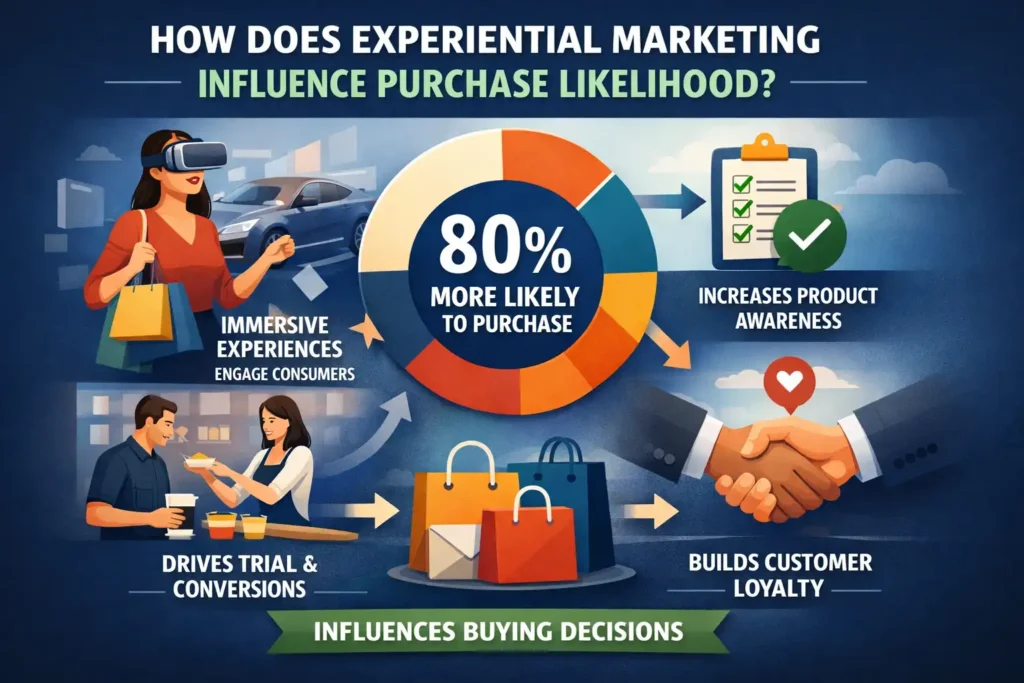
Increased purchase likelihood through experiences
An impressive 87% of consumers are more likely to purchase a product after a positive brand experience. This statistic underscores the power of experiential marketing in driving sales and converting interest into action.
By creating engaging and enjoyable experiences, brands can build trust and confidence in their products. These positive interactions make consumers more inclined to make a purchase, leading to higher sales and customer loyalty. Experiential marketing thus serves as a powerful tool for increasing purchase likelihood and driving revenue.
29. What Impact Does Experiential Marketing Have on Customer Advocacy?
Enhancing customer advocacy through experiences
A substantial 75% of brands say experiential marketing has a significant impact on customer advocacy. This statistic highlights the role of memorable experiences in turning customers into enthusiastic advocates for the brand.
When consumers have positive experiences with a brand, they are more likely to recommend it to others. This advocacy can enhance brand visibility and credibility, attracting new customers and driving growth. By investing in experiential marketing, brands can create experiences that foster strong customer advocacy and enhance their market position.
30. How Do Consumers’ Perceptions of Brands Change After Experiential Events?
Improved brand perceptions post-event
A significant 70% of consumers say their perception of a brand improves after a brand experience. This statistic underscores the effectiveness of experiential marketing in shaping positive brand perceptions and enhancing reputation.
By creating enjoyable and memorable experiences, brands can build positive associations and foster goodwill among consumers. These improved perceptions can lead to increased loyalty, repeat business, and word-of-mouth promotion. Experiential marketing thus serves as a powerful tool for enhancing brand image and reputation.
Conclusion
Experiential marketing is more than just a trend—it’s a powerful strategy that can significantly impact consumer behavior, brand perception, and business growth. The statistics highlighted in this article demonstrate the effectiveness of creating memorable experiences in engaging consumers, driving sales, and building long-term loyalty.
We got all the latest Marketing Stats here:
Read Next
- Mastering Sales Intelligence: Strategies for Smarter Selling
- Unlocking the Power of Sales Acceleration: Strategies for Rapid Growth
- Original Equipment Manufacturing Agreements: All You Need to Know
- SaaS Agreements Explained: Tips for Successful Software as a Service Contracts
- Demystifying End-User License Agreements (EULA): What You Need to Know





















Comments are closed.